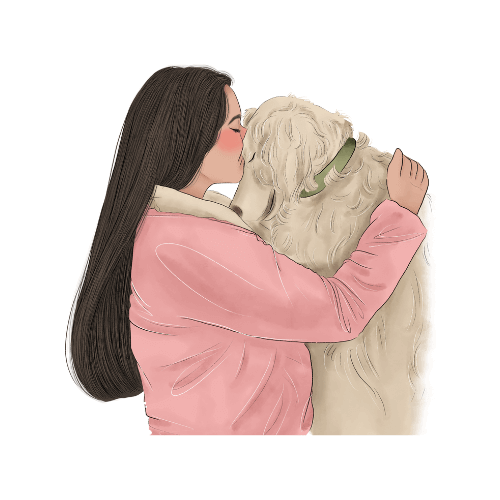Animal-Assisted Therapy
Discover the transformative power of Animal-Assisted Therapy. Strengthen connections, reduce anxiety, and foster emotional well-being.


Animal-Assisted Therapy
The use of dogs in Animal-Assisted Therapy is rooted in the evolutionary bond between humans and dogs, coupled with a growing body of scientific evidence demonstrating that regular interactions with a dog in a therapeutic setting yield significant effects on physical and mental health.
Our symbiotic relationship with dogs dates back to the dawn of humanity, as evidenced by ancient cave drawings depicting dogs alongside our early human ancestors, sharing meals around campfires and assisting in hunts. Over the millennia, canines have continued to evolve into ideal human companions. They exhibit a remarkable sensitivity to our emotions, surpassing even our closest living relative, the chimpanzee. Dogs respond to our needs with extraordinary affection, loyalty, and care. In response, humans have adapted as well; even making eye contact with a dog has been shown to significantly reduce cortisol (stress hormone) levels, lower blood pressure, alleviate stress and anxiety, reduce pain, and facilitate learning.
Therapy with Your Dog
The bond between a dog and its owner bears similarities to human caregiver-infant relationships and can aid in mending disrupted attachments, one of the advantages of Animal-Assisted Therapy (Sable, 2013). While dogs are not babies, they display behaviors of attachment, such as approaching, following, clinging, or vocalizing toward their owners. We can refer to these as ‘closeness’ signals. Establishing a strong bond with your canine companion can reduce anxiety not only in your pet but also in yourself. This attachment fosters trust, empathy, and open communication, improving relationships with family, friends, coworkers, and partners.
We often manage our future distress by maintaining emotional distance in the present, which ultimately leaves us disconnected from both ourselves and those around us. Striving for a secure attachment with your dog can provide you with the courage and emotional resources to engage with life’s challenges fully.
Therapy for Your Pet
Unfortunately, the loss of a pet can disrupt the attachment between a pet owner and their animal, leading to significant suffering (Brown & Symons, 2016). Treating traumatic pet loss may require the integration of attachment theory to help individuals mend what has been broken. Seeking psychotherapy for pet loss can alleviate distress and aid in processing complex grief, allowing for a new understanding of oneself and the world.
Meet Geege
I am Geege, a four-year-old Golden Retriever who delights in helping people feel comfortable and loved. I have a deep affinity for water in all its forms, from puddles to ponds—I’ll eagerly dip my paws in any of them. My journey began with training in the California prison system, where I later transitioned into my role as a therapy support dog. When I’m not assisting my clients at work, you’ll find me basking in the warmth of the sunshine!
- Graduate of New Life K9’s Bond-Based Training program (2020)
- Passed Public Access Test (PAT) (2020)
Schedule a consultation today to see how we can enhance your therapeutic experience using Animal-Assisted Therapy!



